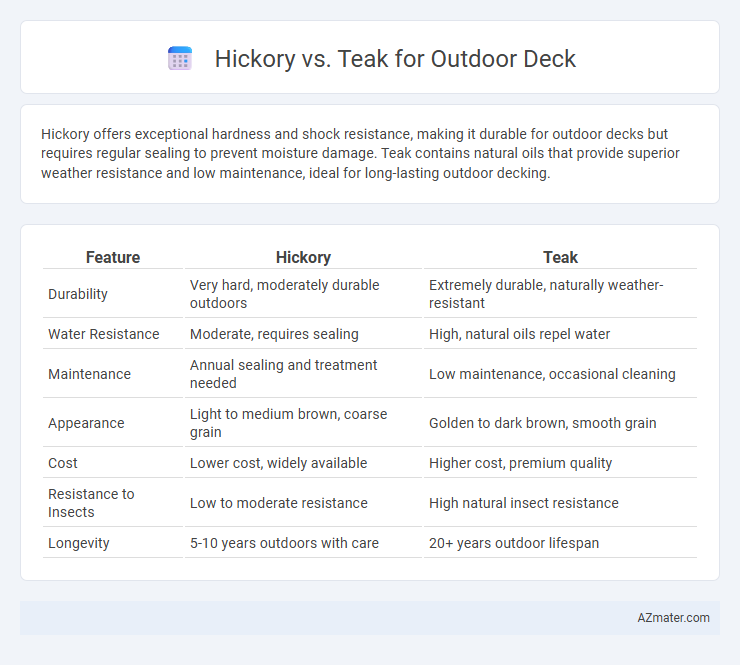Hickory offers exceptional hardness and shock resistance, making it durable for outdoor decks but requires regular sealing to prevent moisture damage. Teak contains natural oils that provide superior weather resistance and low maintenance, ideal for long-lasting outdoor decking.
Table of Comparison
| Feature | Hickory | Teak |
|---|---|---|
| Durability | Very hard, moderately durable outdoors | Extremely durable, naturally weather-resistant |
| Water Resistance | Moderate, requires sealing | High, natural oils repel water |
| Maintenance | Annual sealing and treatment needed | Low maintenance, occasional cleaning |
| Appearance | Light to medium brown, coarse grain | Golden to dark brown, smooth grain |
| Cost | Lower cost, widely available | Higher cost, premium quality |
| Resistance to Insects | Low to moderate resistance | High natural insect resistance |
| Longevity | 5-10 years outdoors with care | 20+ years outdoor lifespan |
Introduction to Hickory and Teak Decking
Hickory decking offers exceptional hardness and durability, making it highly resistant to wear and ideal for heavy foot traffic in outdoor spaces. Teak decking stands out for its natural oils and dense grain, which provide superior weather resistance and protect against moisture, decay, and insect damage. Both hickory and teak deliver unique aesthetic appeal, with hickory's rich, varied tones complementing rustic designs and teak's smooth, golden hues enhancing contemporary decks.
Durability Comparison: Hickory vs Teak
Teak offers superior durability for outdoor decks due to its natural oils that resist moisture, decay, and insect damage, making it highly weather-resistant over time. Hickory, while hard and dense, is more prone to cracking and requires regular sealing to withstand outdoor conditions effectively. Teak's inherent strength and low maintenance needs make it a preferable choice for long-lasting outdoor decking compared to hickory.
Weather Resistance: Which Wood Performs Better Outdoors?
Teak exhibits superior weather resistance for outdoor decks due to its natural oils that protect against moisture, insects, and rot, ensuring long-lasting durability in various climates. Hickory, while extremely hard and dense, tends to absorb water more readily and may require additional sealing to withstand prolonged exposure to rain and humidity. For outdoor applications demanding minimal maintenance and exceptional resilience, teak is the preferred choice.
Maintenance Requirements for Hickory and Teak Decks
Hickory decks require regular sealing and staining to prevent moisture absorption, cracking, and fading due to their dense grain and high hardness, which can lead to faster weathering if neglected. Teak decks offer superior resistance to rot, decay, and insects with natural oils, significantly reducing maintenance frequency to occasional cleaning and light sanding to maintain smoothness and color. Both woods benefit from periodic inspection, but teak's inherent durability and oil content make it a more low-maintenance choice for outdoor decking.
Aesthetic Differences: Color, Grain, and Texture
Hickory features a diverse color palette ranging from creamy white to rich brown with bold, irregular grain patterns, offering a rustic and dynamic aesthetic for outdoor decks. Teak is prized for its warm golden-brown hue and smooth, straight grain, providing a sleek and elegant appearance that ages to a sophisticated silver-gray patina. The coarse texture of hickory contrasts with teak's naturally oily, fine-grain surface, enhancing teak's resistance to moisture and weathering in outdoor environments.
Cost Analysis: Hickory vs Teak
Hickory offers a more budget-friendly option for outdoor decking with prices typically ranging from $3 to $7 per square foot, making it accessible for larger projects. Teak's higher cost, often between $25 and $35 per square foot, reflects its superior durability, natural oils, and resistance to weather and pests. Cost-effective maintenance for hickory involves regular sealing, while teak's natural oils reduce upkeep expenses over time despite its upfront price.
Sustainability and Environmental Impact
Hickory offers a sustainable option for outdoor decks due to its rapid growth rate and widespread availability in North America, which reduces the environmental impact of harvesting. Teak, while highly durable and weather-resistant, often raises sustainability concerns because it is typically sourced from tropical rainforests where logging can contribute to deforestation and habitat loss. Choosing FSC-certified teak or reclaimed wood can mitigate environmental impacts, but hickory remains the greener choice for eco-conscious decking projects.
Installation and Workability for Deck Builders
Hickory's dense grain and hardness make it challenging to cut and fasten, requiring pre-drilling and specialized tools for installation, which can increase labor time and costs for deck builders. Teak offers superior workability with its natural oils providing resistance to splitting and easier machining, resulting in smoother cuts and faster installation. Deck builders prioritize teak for projects demanding efficiency and durability, while hickory may be chosen for its strength but demands more effort during assembly.
Longevity and Warranty Considerations
Teak offers exceptional longevity for outdoor decks, often lasting 40 to 50 years due to its natural oils that resist moisture, decay, and insects, making it a preferred choice for durability. Hickory, while strong and dense, generally has a shorter lifespan outdoors, typically around 10 to 20 years, and requires regular maintenance to prevent weathering and rot. Warranty considerations for teak decks tend to be more favorable, with many manufacturers providing extended warranties of 20 years or more, whereas hickory decking warranties are usually limited to 5 to 10 years, reflecting the material's shorter outdoor durability.
Which is Better for Your Outdoor Deck: Hickory or Teak?
Teak offers superior durability and natural resistance to moisture, insects, and decay, making it an excellent choice for long-lasting outdoor decks. Hickory is harder and more affordable but requires regular maintenance and sealing to prevent weather damage and rot. For a low-maintenance, weather-resistant outdoor deck, teak is the better option, while hickory suits budget-conscious projects with committed upkeep.

Infographic: Hickory vs Teak for Outdoor Deck
 azmater.com
azmater.com